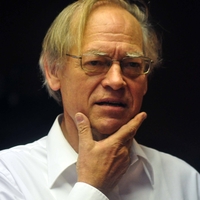Papers by alexei nesteruk
Труды Кафедры богословия Санкт-Петербургской духовной академии, 2020

The paper discusses the problem of demarcation between the dimensions of natural and the human sc... more The paper discusses the problem of demarcation between the dimensions of natural and the human sciences in contemporary cosmology. In spite of a common presumption that cosmology is a natural science, the specificity of its alleged subject matter, that is the universe as a whole, makes cosmology fundamentally different from other natural sciences. The reason is that in cosmology the subject of cosmological research and its "object" are in a certain sense inseparable. Any study of the universe involves two opposite perspectives which can be described as "a-cosmic" and "cosmic", egocentric and non-egocentric. Cosmology involves two languages, namely that of physical causality (pertaining to the natural sciences) and that of intentionality (pertaining to the human sciences). On the one hand the universe can be seen as a product of discursive reason, that is as an abstract "physical" entity unfolding in space and time. On the other hand the universe can be experienced through our participation in, or communion with the world understood as the natural context of living beings. This dichotomy between reason and experience, abstract construction and concrete participation, originates in the essence of human persons understood as unities of the corporeal and spiritual. On account of this dichotomy it is hard to set up a strict line of demarcation between the elements of the human and the natural sciences in cosmology. This confirms the intuition that any realistic world view is incomplete without a knowledge of what it means to exist as a human being. Conversely it is likewise impossible to understand human existence without considering its natural setting, that is the universe. We conclude that anthropology is incomplete without cosmology and vice versa.
Sov. J. Nucl. Phys. (Engl. Transl.); (United States), Jul 1, 1983
The technique of diagonalizing the Hamiltonian by means of Bogolyubov transformations is used to ... more The technique of diagonalizing the Hamiltonian by means of Bogolyubov transformations is used to study the quantum effects of scalar conformally noninvariant particles in the quasi-Euclidean Friedmann model. Expressions are obtained for the complete energy-momentum tensor of the created particles and the vacuum polarization. On the basis of an analysis of the energy density of the matter created in the early stages of evolution of the universe it is concluded that the creation rate for particles of this type dominates over that of conformal particles.
Известия Российского государственного педагогического университета им. А.И. Герцена, 2013
It is argued that an effective methodology of contemporary mathematical cosmology related to the ... more It is argued that an effective methodology of contemporary mathematical cosmology related to the modelling of the very early stages of the evolutionary universes consists not in the principle of correspondence of its theoretical constructs with empirical reality, but in the coherence of epistemic justification which relates to the belief-like commitments of the community of cosmologists.
Труды Кафедры богословия Санкт-Петербургской духовной академии, 2023
Theology and Science, Dec 30, 2022
Труды Кафедры богословия Санкт-Петербургской духовной академии, 2023
arXiv (Cornell University), Mar 21, 1997
We present a simple, exact and self-consistent cosmology with a phenomenological model of quantum... more We present a simple, exact and self-consistent cosmology with a phenomenological model of quantum creation of radiation due to vacuum decay. The decay drives a non-isentropic inflationary era, which exits smoothly to the radiation era, without reheating. The initial vacuum for radiation is a regular Minkowski vacuum. The created radiation obeys standard thermodynamic laws, and the total entropy produced is consistent with the accepted value.
In this paper we continue to study the epistemic nature of cosmological claims, in particular the... more In this paper we continue to study the epistemic nature of cosmological claims, in particular the status of the notion of the universe as a whole. It is demonstrated that this notion has a status of a construct with some epistemic links with empirical reality. However, it is argued that the effective methodology of contemporary mathematical cosmology related to the modelling of the very early stages of the evolutionary universes, consists not in the principle of correspondence of its theoretical constructs with empirical reality, but in the coherence of epistemic justification which relates to belief-like commitments of the community of cosmologists. As a case study, the inflationary model of the early universe is analysed and it is demonstrated that the coherence of justification leads to the transcendental problems in the style of Kant.
Труды Кафедры богословия Санкт-Петербургской духовной академии, 2022
Журнал Сибирского федерального университета. Гуманитарные науки, 2020
Orthodox Christianity and Modern Science, 2021
Physics of Atomic Nuclei - PHYS ATOM NUCL-ENGL TR, 1995
Possible effects of the linear and circular polarization of an electromagnetic field propagating ... more Possible effects of the linear and circular polarization of an electromagnetic field propagating in a space-time with metric of the Bianchi-1 type are considered. It is shown that, for a free field, the degrees of linear and circular polarization are conserved as the photon travels along a geodesic. The angle of rotation of the polarization plane is calculated in the axially symmetric case. 29 refs.
Journal of Siberian Federal University, 2014
The paper, as a historical insight in the development of views about the place of humanity in the... more The paper, as a historical insight in the development of views about the place of humanity in the universe, discusses the relevance of patristic thought, in particular ideas of the 7th century’s Byzantine monk-theologian Maximus the Confessor for modern cosmology. It is argued that patristic ideas on the central position of humanity in the universe and the possibility of its knowledge remain relevant for modern cosmology which, in a way, allows one to elucidate old philosophical ideas. The modern scientific claim on the power of humanity to articulate the universe as a whole is compared with Maximus’ ideas on grasping the sense of creation through the God-given ability.

The Catholic Historical Review, 2013
Recent discussions on the relation between religion and science in various historical contexts ha... more Recent discussions on the relation between religion and science in various historical contexts have mitigated an earlier view, influenced by Enlightenment anticlericalism, that this encounter was generally inimical.The volume under review offers Greek-speaking Eastern Orthodoxy as an example inviting further reflection on this problem. It also partly redresses the lack of any monograph on Byzantine science (pp. 197-202), generated by a widely shared perception that Byzantium was marginal to developments in world history and that the Byzantine legacy of the entire Orthodox world (Greek, Slavic, or other) is incompatible with and obstructive to modernity. Accordingly, researching the sciences among Orthodox Christians under Ottoman rule meant measuring Greek progress toward modernity and eventually explaining what led to the creation of a modern Greek nation-state.











Uploads
Papers by alexei nesteruk